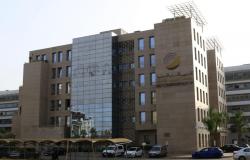
People watch live voting results at the National Results Center of the Independent Electoral Commission (IEC) in Midrand, South Africa, on May 31, 2024 (AFP / Michele Spatari)
The ANC, in power in South Africa for thirty years, is heading towards a historic setback in the legislative elections, with the 85% results of the count announcing the loss of its absolute majority in the Assembly and the obligation to form a government of coalition.
At 8:00 p.m. GMT, the African National Congress (ANC) received 41.12% of the votes counted, according to the Electoral Commission (IEC), remaining below the crucial 50% mark. The party won 57% of the votes in the last legislative elections, in 2019.
The first opposition party (Democratic Alliance, DA, liberal center) currently has 21.95% of the vote. The very recent populist party Umkhonto We Sizwe (MK) of the sulphurous ex-president Jacob Zuma, made a breakthrough to 13.5%, while the left-wing radicals of the Economic Freedom Fighters (EFF) stagnated at 9.4%.
Participation currently stands at 58.47%, down from 66% recorded in the previous election. Final results are not expected until Saturday at the earliest.
At the end of the election, the most contested in the history of democracy born in the country with the election of Nelson Mandela in 1994, 400 deputies will be elected. They will choose the next president.
ANC representatives monitor voting results live at the National Results Center of the Independent Electoral Commission (IEC) in Midrand, South Africa, on May 31, 2024 (AFP / Michele Spatari)
Since the start of the count on Wednesday evening, the partial results have reflected the forecasts of experts and opinion polls in recent weeks, which gave between 40% and 47% of voting intentions to the ANC.
The disillusionment of South Africa’s 62 million people, fueled by endemic unemployment, growing poverty and record crime, appears to have overcome stubborn loyalty to the party that liberated the country from racial segregation.
For many voters, the party which has long embodied the dream of a nation with access to education, housing and basic services, has not kept its promises.
Daily life is poisoned by recurring water and electricity cuts. And repeated corruption scandals involving senior party dignitaries have damaged confidence.
– Zulu country in the hands of Zuma –
The historic party, which currently holds 230 seats of deputies (57.5%), should remain the largest political party in the National Assembly. Weakened, he will have to resolve to form alliances and hold negotiations on the formation of a coalition government.
Democratic Alliance (DA) leader John Steenhuisen, center, surrounded by media at the national results center of the Independent Electoral Commission (IEC) in Midrand, South Africa, May 31, 2024 (AFP / Michele Spatari)
Experts and observers are still struggling to predict what the formula could be, but party leaders have already expressed their opinion.
“We will not enter into discussions with Cyril Ramaphosa’s ANC,” insisted MK spokesperson Nhlamulo Ndhlela. “We will dialogue with the ANC but not with Cyril Ramaphosa’s ANC.”
The ANC will indeed have to choose between making concessions with the DA, which promised to “Save South Africa” through privatization and deregulation. Or if he risks a rapprochement with the EFF and its incendiary demands such as the redistribution of land to blacks and the nationalization of key economic sectors.
The party will also have to determine whether it is ready for a pact with MK, led by former ANC pillar Jacob Zuma who has been declared ineligible. But the gap between President Cyril Ramaphosa and his Zulu predecessor Jacob Zuma, long-time political enemies, will be difficult to bridge, experts anticipate.
Composition of the outgoing Parliament of South Africa, before the elections of May 29 (AFP / Guillermo RIVAS PACHECO)
The MK is on the verge of winning the Zulu province (East), the traditional stronghold of the ruling party and a key province bringing together more than 20% of the electorate. It is in the lead with nearly 45.5% of the votes against just over 18% for the ANC.
A clear victory for the small party in the region would deal an additional blow to Ramaphosa, 71, who is counting on a second term but whose continuation could be compromised if the disappointing results of his party are confirmed.





